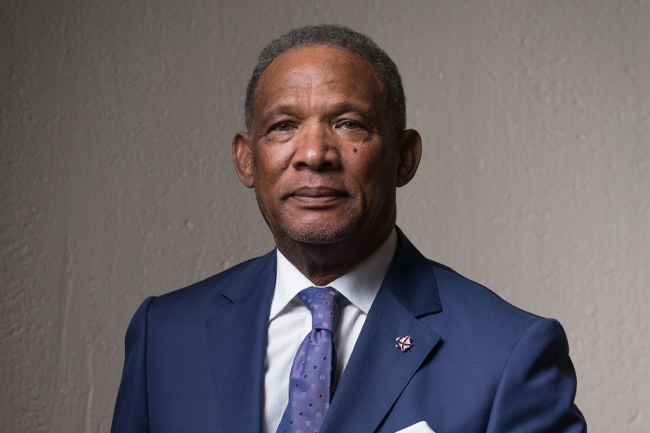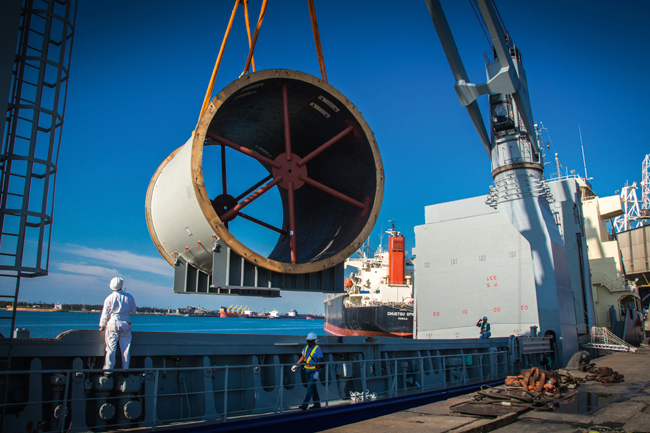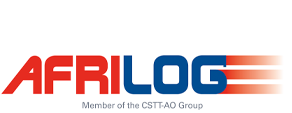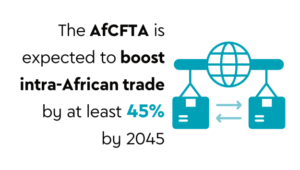A mill shell, for the gold mining industry, that weighs some 180 tons and spans 5.9m x 8m, is obviously considered an abnormal load in the transport industry. For Afrilog – the company that has been designing, executing and managing Africa-specific supply-chain solutions for some 20 years – the approach by a customer to deliver one from Vereeneging via Richards Bay, South Africa, to a site in Liberia, was therefore not considered to be particularly daunting; challenging yes, but not impossible, which proved to be the case.
Basil Pietersen, Southern Africa Group Executive of Afrilog, explains that doing due diligence prior to delivery is standard procedure, so Afrilog had anticipated and prepared for most of the challenges it would face when the mill shell arrived at the port of Monrovia, in Liberia.
‘We knew that the Liberian port was not equipped to offload the abnormal load, which is why we shipped the mill shell on a geared vessel equipped with our own cranes, to position it onto a specially imported truck. Shortly after that was when things became interesting.
‘The port exit gate was too narrow and not high enough to allow the vehicle to pass through, which required us to dismantle and rebuild it the same day,’ says Pietersen.

Problem solved, the truck made its way along narrow streets, encountering not only low-hanging cables and electrical wires that required disconnection and reconnection but also the physical removal and rebuilding of ‘corner shops’. Pietersen says that even these obstacles were anticipated and not of particular concern. What was, however, was the presentation of a low bridge.
‘We had previously acquired permission from the road authorities to scrape away the road surface beneath the bridge to facilitate the truck and cargo’s passing, but this permit was withdrawn on our arrival. The authorities stated that it would be too disruptive for traffic flow. The only way to move forward was to lift the mill shell from the truck and pass it over the bridge and reload it on the other side, using a crane we urgently sourced from Accra, Ghana.’
Along the 200 km route, Afrilog also filled in potholes (requiring 21 truckloads of sand) and levelled road edges so the gradient was properly in line to facilitate the balancing of the cargo. Overgrown roadside vegetation was also removed by the convoy accompanying the truck. ‘When we arrived at our destination three days later – equating to roughly 3 km/h – seasonal rains had washed away roads as well as the bridge linking us to the delivery site,’ he says. ‘Again, we improvised by filling containers with cement that we laid on the ground, which allowed the truck to pass over – and just held.’
What this highlights is that Afrilog is agile and solutions-focused; that no matter what the challenges, it will and does mobilise its networks to get cargo delivered. And it has been operating in this manner since it was established in 2000.
As a family-based business, it comes with an inherent sense of ‘ownership, accountability, dedication, pride and commitment’ – qualities the company’s highly specialised clientele in the mining, industrial, hospitality, infrastructure and construction sectors of the continent experience daily. And because Afrilog is a member of the global CSTT-AO Group (which includes AGS and Multilog), innovation is ingrained in the DNA across all businesses, with CSTT-AO Group being known as one of the logistics and supply chain pioneers in Africa.
‘African operations are co-ordinated from Afrilog’s head office in Johannesburg, South Africa, which is where we also manage client relations,’ says Pietersen. ‘From this base we have directly delivered logistics and supply-chain solutions across sub-Saharan Africa, inclusive of Burkina Faso, Côte d’Ivoire, DRC, Ghana, Guinea, Liberia, Mali, Mozambique, Senegal and Sierra Leone. We also have representation in Botswana, Eritrea, Ethiopia, Mauritania, Namibia, Nigeria and Zambia.’
Some of these nations present uncertain territory, be that political or in terms of compliance regulations. ‘The inconsistencies and lack of uniformity in requirements across borders can cause significant delays in the movement of goods. We are obviously aware of the resulting financial implications for our clients, and do everything possible to minimise those,’ says Pietersen. ‘And let’s not forget epidemics like SARS, Ebola and the recent COVID-19 that have intensified the challenges of doing business, especially across multiple borders.’

Having an on-the-ground presence in many of the countries in which it operates means that Afrilog has the ability to provide local sourcing and procurement alternatives if required. ‘Any number of multiple factors intensify the burden on an efficient supply chain on the continent,’ says Pietersen. ‘But these are impacts that stimulate our innovative nature to design integrated logistics solutions that are nimble and effective.’
The most pervasive challenges, according to Pietersen, lie in infrastructure. ‘Governments are beginning to accept that without significant investment and improvements in infrastructure, businesses cannot thrive, and they are consequently engaging with service providers like Afrilog to clarify the challenges we collectively face, and work[ing] with logistics and freight forwarders to jointly find solutions.’
Nurturing partnerships, be that with government officials or transport and port authorities, is considered crucial if Afrilog is to deliver cargo expeditiously to destinations along both known – and unfamiliar – routes.
‘We continually interact with like-minded local businesses to ensure we, and they, stay abreast of developments and, where possible, ahead of any curves,’ says Pietersen, adding that ‘these relationships are critical resources that enable us to use alternative corridors or routings to overcome political, social and climatic conditions’.
Afrilog is also supported in its procurement, sourcing and international freight forwarding operations by Belgium’s Commercial Trading Agency (CTA), and its associate company Uni-Forwarding International (UFI), which were acquired six years ago. CTA and UFI, says Pietersen, are recognised leaders in procurement services, and were brought into the stable based on their experience in servicing the African continent.
For clients, the acquisition added enormously to Afrilog’s already well-established offerings of port operations, warehouse and consulting support services, IT, project management and training. ‘We are therefore able to comprehensively and holistically approach supply-chain management projects, freeing up customers’ time and concerns so they can focus on their core business.’
Pietersen is also personally adding value to Afrilog’s reputation. He was recently appointed as president of the International Federation of Freight Forwarders Association (FIATA). This organisation represents 160 countries globally, comprising 40 000 logistics and forwarding firms that together employ up to 10 million people. ‘I am fully committed to serving the institution and playing a role in seeing FIATA projects come to fruition, and ensuring all future developments undertaken in my presidency are done so in the best interest of the organisation, its members and stakeholders. It is humbling that this honour comes to me without solicitation, and it further entrenches Afrilog’s presence in the industry. For a family-owned business such as ours, the felicitation is shared across all aspects of our business.’
This very strong sense of family is also generously invested in corporate social responsibility. Afrilog believes it is through education that poverty will be alleviated. School children in local communities are thus provided access to the basics, such as books, stationery and school uniforms. Most recently Afrilog sponsored the construction of a soup kitchen on the grounds of a church that works towards catering to the needs of an underprivileged community.
Service and a ‘can-do’ attitude are inherent in the nature of Afrilog, as demonstrated, and it’s the same philosophy that it uses when dealing with customers, and one that will not change in the future, with growth.
‘As a company our vision is to be the leading independent African service provider operating globally and as a specialist in supply-chain management and integrated logistics solutions. The bottom line is that Afrilog is, and always will always be, a projects company… Nothing is too big or small,’ says Pietersen.
‘There are incredible opportunities for businesses across the continent; to be successful one must be willing to put in the work and demonstrate a commitment to mutual benefit, and Africa will embrace you.’
















